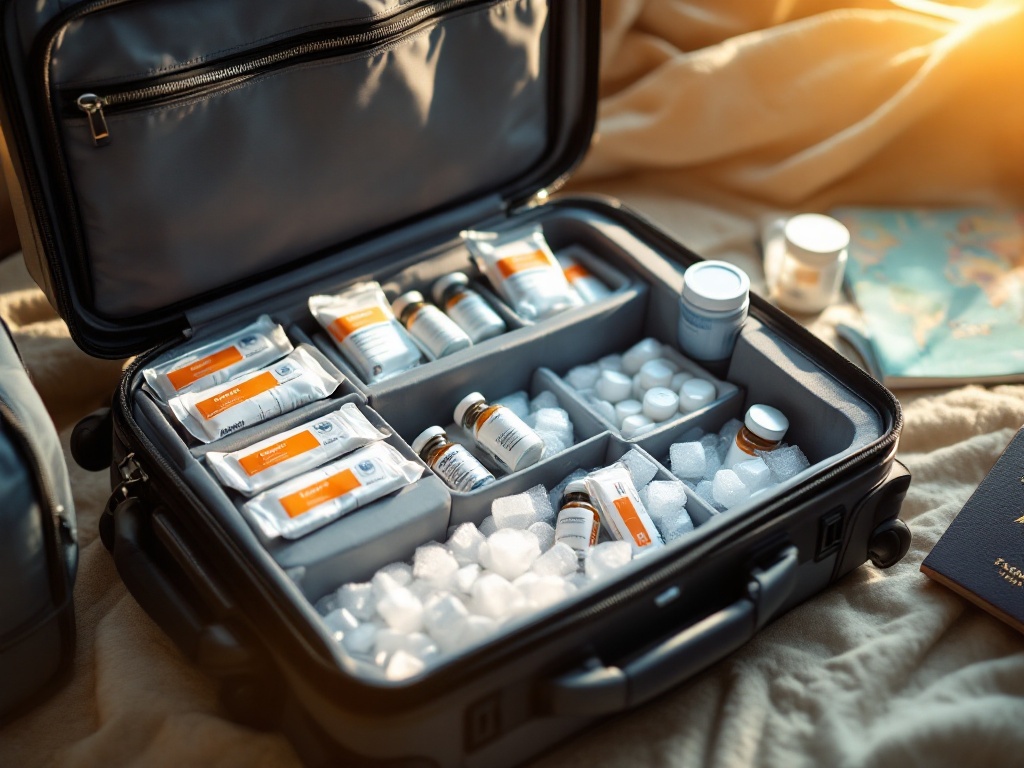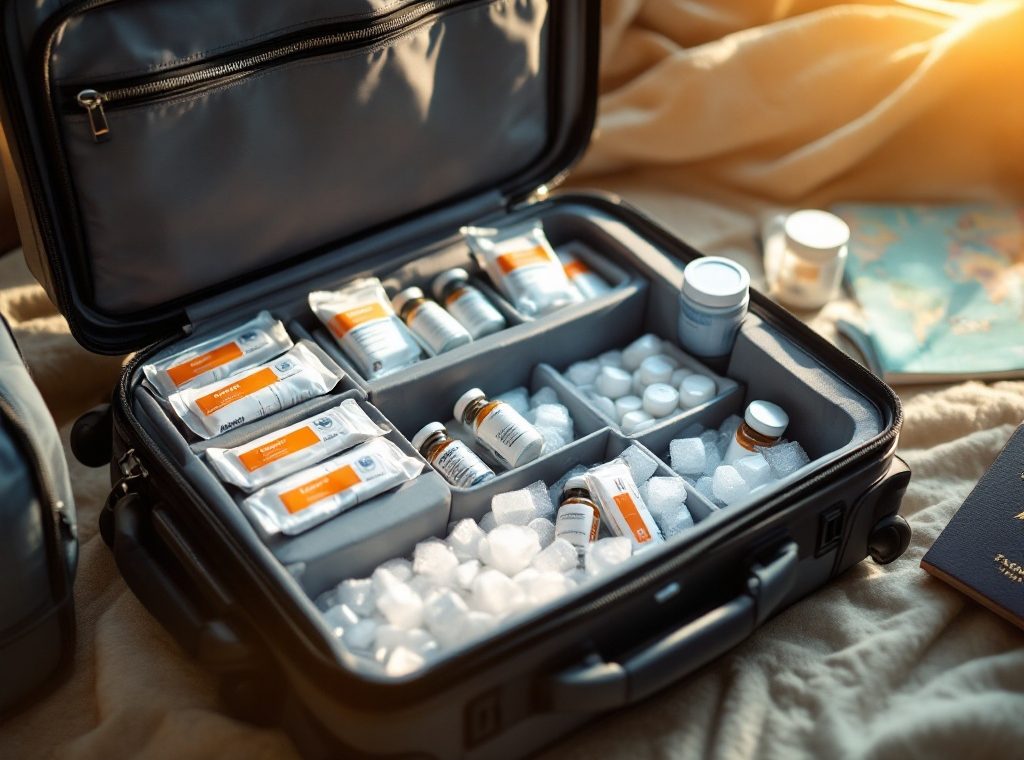How to Travel with Medication that Needs Refrigeration: Travel Advice
Traveling with refrigerated medications? Don’t let temperature-sensitive meds derail your trip. This guide provides crucial steps for safe and efficient transport, from packing and storage solutions to navigating TSA regulations and international travel. Learn how to prepare, store, and manage your medications, ensuring a smooth, worry-free journey. Discover expert advice now for a healthy and stress-free travel experience.
Important information

- Carry your refrigerated medications in their original, labeled containers within your carry-on bag.
- Get a doctor’s letter specifying your need for the medication and its storage requirements.
- Research your destination’s rules about bringing in medications, including any limits or required paperwork.
- Tell the TSA officer about any medically necessary liquids over 3.4 ounces.
- Pack extra medication and cooling supplies to prepare for possible travel delays.
Essential Preparations for Traveling with Refrigerated Medication
Traveling with refrigerated medication requires careful preparation. Follow these steps to ensure a smooth and safe journey:
Consult your physician. Discuss the duration of medication storage and any specific requirements your medication may have.
Obtain a medical letter. This letter should outline the purpose of the medication, its necessity, and instructions for proper storage.
Research destination regulations. Check your destination’s rules regarding medication importation limits and any required documentation.
Pack a sufficient supply. Ensure you have enough medication to last the entire trip, accounting for potential delays.
Use original, labeled containers. Transport your medication in its original, clearly labeled containers, and store it securely in your carry-on bag to minimize the risk of damage or loss.
Understanding Medications That Require Cold Storage
Some medications need refrigeration to maintain their potency and effectiveness. For example, insulin must be kept cold. This also applies to vaccines and certain injectables, including biologics. Improper storage can render these treatments ineffective and potentially dangerous. Always consult the packaging or a healthcare professional, such as a doctor or pharmacist, for proper storage guidance.
Gathering Necessary Documentation
When traveling, pack essential medications, but remember a doctor’s prescription or medical certificate. Many countries mandate this documentation. To ensure a smooth trip, confirm permitted medications with your destination’s embassy. This step not only verifies your medication’s legality but also prevents potential complications. Here’s a helpful checklist for traveling with medication:
Pack essential medications.
Carry a doctor’s prescription or medical certificate.
Confirm permitted medications with your destination’s embassy.
Choosing the Right Storage Solutions for Your Trip
Streamlined String Management with Specialized Tools
Choosing the right software components is crucial for development. String management has historically been complex, but tools like “royal referees” offer a streamlined solution for handling history blocks and their strings. These tools are especially valuable for UI design, ensuring each element receives precise instructions for an optimal user experience.
- Simplifies string management within history blocks,
- Ensures precise instructions for UI elements,
- Facilitates informed component selection for optimal UX.
Enhancing Readability with “Water Referees”
Within the initial code block, history strings are critical. “Water referees” simplify and format complex quotes, enhancing readability and user experience. While accuracy is paramount, occasional adjustments to quotes may be necessary for clarity. Proper quote placement significantly impacts user understanding, and these tools ensure clear and effective presentation.
- Simplifies and formats complex quotes,
- Improves readability and user experience,
- Streamlines quote management in complex UI sections.
Optimizing Display Preferences with Value Referees
Display preferences are crucial, and value referees consider user preferences when selecting display settings. While some settings might require adjustments based on logic and user feedback, these tools balance these factors for a positive user experience.
- Considers user preferences for display settings,
- Balances logic and user feedback for optimal settings,
- Prioritizes a smooth and intuitive user experience.
Improving Performance through Efficient String Management
String management techniques influence performance. Value referees ensure efficient string handling and prioritize clarity, making text easy to understand. Careful quote placement, considering potential user interpretations, is crucial for accurate representation.
- Ensures efficient string handling and clarity,
- Prioritizes clear and concise language,
- Uses active voice and varied sentence structure for engagement.
Using a Cooler Bag and Ice Packs
Canvas cooler bags provide a convenient solution for carrying temperature-sensitive medications. They use medical-grade ice packs to maintain the necessary temperature, ensuring medication safety and effectiveness, especially during travel.
Hotel Refrigerators and Alternative Storage Options
Traveling with medications requiring refrigeration? Here’s how to ensure they stay cool:
Many hotel rooms include refrigerators, perfect for storing medications.
If your room lacks a refrigerator, inquire at the front desk about medication storage options.
For added safety, consider bringing a portable cooler with ice packs as a reliable backup.
Managing Medication Storage When Fridges Are Unavailable
Traveling without a cooler? Resealable sandwich bags filled with ice can keep your medications at the right temperature. Simply fill and seal a bag tightly for a portable, medicine-safe chill pack. Before you go, consult your doctor for additional tips on safe medication storage during your travels.
Navigating TSA Regulations and Security Checkpoints
Traveling with refrigerated medications? TSA allows medically necessary liquids, gels, and aerosols, even if they exceed the standard 3.4-ounce limit. Simply declare these items to a TSA officer at the security checkpoint. Solid medications also require screening. Clearly label your refrigerated medications and store them in appropriate containers. Informing officers about all your medications will expedite the screening process.
Declare medically necessary liquids, gels, and aerosols exceeding 3.4 ounces to a TSA officer.
Ensure all solid medications are also presented for screening.
Clearly label refrigerated medications and store them in appropriate containers.
Inform TSA officers about all medications to expedite the screening process.
Understanding the 3-1-1 Liquids Rule Exemption
Planning a trip? Remember the 3-1-1 Liquids Rule for carry-on luggage. All liquids, gels, and aerosols must be in 3.4-ounce or smaller containers. These containers must fit in a single, quart-sized, clear plastic, zip-top bag. Medically necessary liquids, including refrigerated medications, are allowed in larger quantities. You can also bring frozen gel packs to keep them cool.
Declaring Medically Necessary Liquids
Inform the TSA officer at airport security about any medically required liquids, gels, or aerosols exceeding 3.4 ounces (100 milliliters). These items are permitted in reasonable quantities.
Informing TSA Officers About Your Medications
Inform TSA officers about any medications you are carrying.
A doctor’s note detailing your prescription and its storage requirements can expedite the screening process.
For easy identification, keep medications in their original, labeled containers. This also prevents confusion.
Airline Policies and In-Flight Considerations
Pack refrigerated medications in your carry-on bag for easy access and to protect them from extreme temperatures in the cargo hold.
Airlines typically allow medically necessary liquids and gels in carry-ons, exempting them from the 3-1-1 rule.
Inform your airline about your refrigerated medication before your flight. Their staff can clarify specific regulations and assist with onboard storage, ensuring a smoother journey.
Keeping Medications in Carry-On Luggage
Pack refrigerated medications in your carry-on bag. This is essential in case your checked luggage is lost or delayed, ensuring you have access to your medicine. Airlines permit these medically necessary liquids in carry-ons, exempting them from standard liquid restrictions.
Communicating with Airline Staff
Traveling with refrigerated medications requires some preparation. Inform your airline about any refrigerated medications you are carrying so they can assist you if needed. A doctor’s note explaining your medication and its storage requirements is also recommended. This note can simplify interactions with security and airline personnel, particularly at checkpoints, and clarifies storage needs for the airline. Always keep your medication in your carry-on luggage, never in checked baggage. A small cooler bag can help maintain the correct temperature during your flight.
Traveling Internationally with Refrigerated Medications
Traveling abroad with refrigerated medication requires careful preparation. Before your trip, research the specific regulations of your destination and any layover countries. Contacting their embassies or consulates can provide the most up-to-date information on importing medications, ensuring a smooth trip and avoiding potential problems. A doctor’s letter detailing your medical condition and confirming the need for refrigerated medication is also recommended. Here’s a step-by-step guide to help you prepare:
Research destination and layover regulations. Find the specific rules for bringing medication into each country on your itinerary. This will help you avoid any surprises or delays during your travels.
Contact embassies or consulates. Reach out to the embassy or consulate of your destination and any layover countries for the most current information on medication import rules. This ensures you have the most accurate details.
Obtain a doctor’s letter. Have your doctor write a letter explaining your medical condition and the necessity of your refrigerated medication. This documentation can be crucial for customs officials.
Checking Destination-Specific Regulations
Traveling with refrigerated medications requires careful planning and attention to your destination’s regulations. These can differ significantly between countries.
Verify that your medication is permitted in the country you’re visiting.
Determine the necessary documentation.
Research proper storage methods for your medication during your travels.
This may include a doctor’s note or a prescription, particularly for controlled substances. Some countries enforce strict regulations on these medications, while others have more lenient rules.
Preparing for Possible Travel Delays
When traveling, pack extra medication in case of potential delays. Store it securely in a reliable cooler with sufficient ice packs to maintain the required temperature. Using a temperature monitor can provide added assurance by tracking the conditions inside the cooler.
What to Do in Case of Emergencies or Medication Shortages
Traveling with medication requires some preparation for a smooth and worry-free trip. Discuss medication storage with your physician, especially if refrigeration is a concern, as they may suggest non-refrigerated options. A doctor’s letter or medical certificate can be invaluable for emergency refills or transfers. Upon arriving at your destination, locate pharmacies that offer medication storage, if needed. Finally, establish backup plans, including emergency contacts.
Carrying a Doctor’s Letter or Medical Certificate
Traveling with refrigerated medications requires a doctor’s letter explaining the medical need and storage requirements. This is especially important for international travel, simplifying airport security navigation and ensuring proper refrigeration at your destination. This letter guarantees access to essential medicine, streamlining a potentially complicated process. Obtain one before your departure.
Emergency Refills and Prescription Transfers
Need a prescription refill urgently? Follow these steps:
Contact your doctor. This is the quickest way to get your prescription refilled.
If your doctor is unavailable, contact your insurance provider. They can help you find a pharmacy that can transfer your prescription.
Contact pharmacies at your destination. Many pharmacies can handle emergency refills and transfers.











